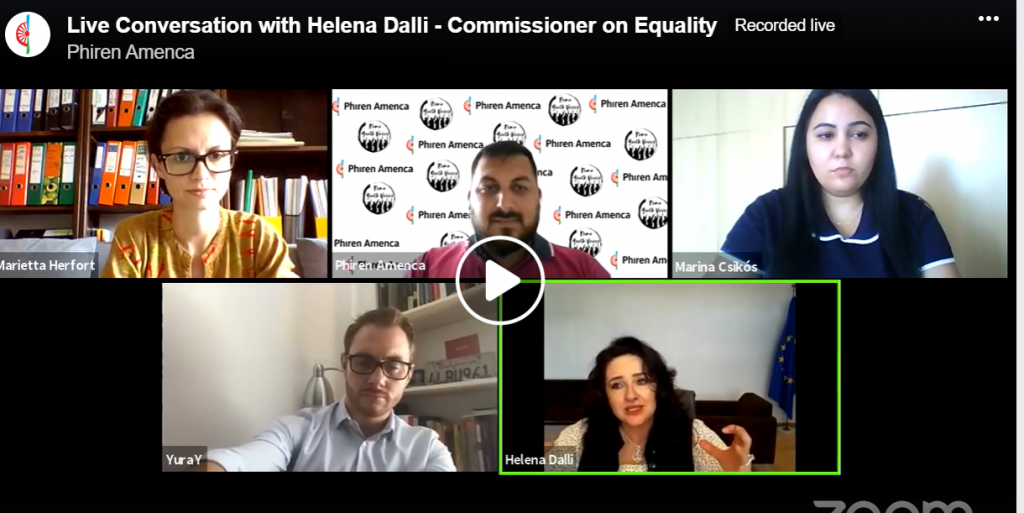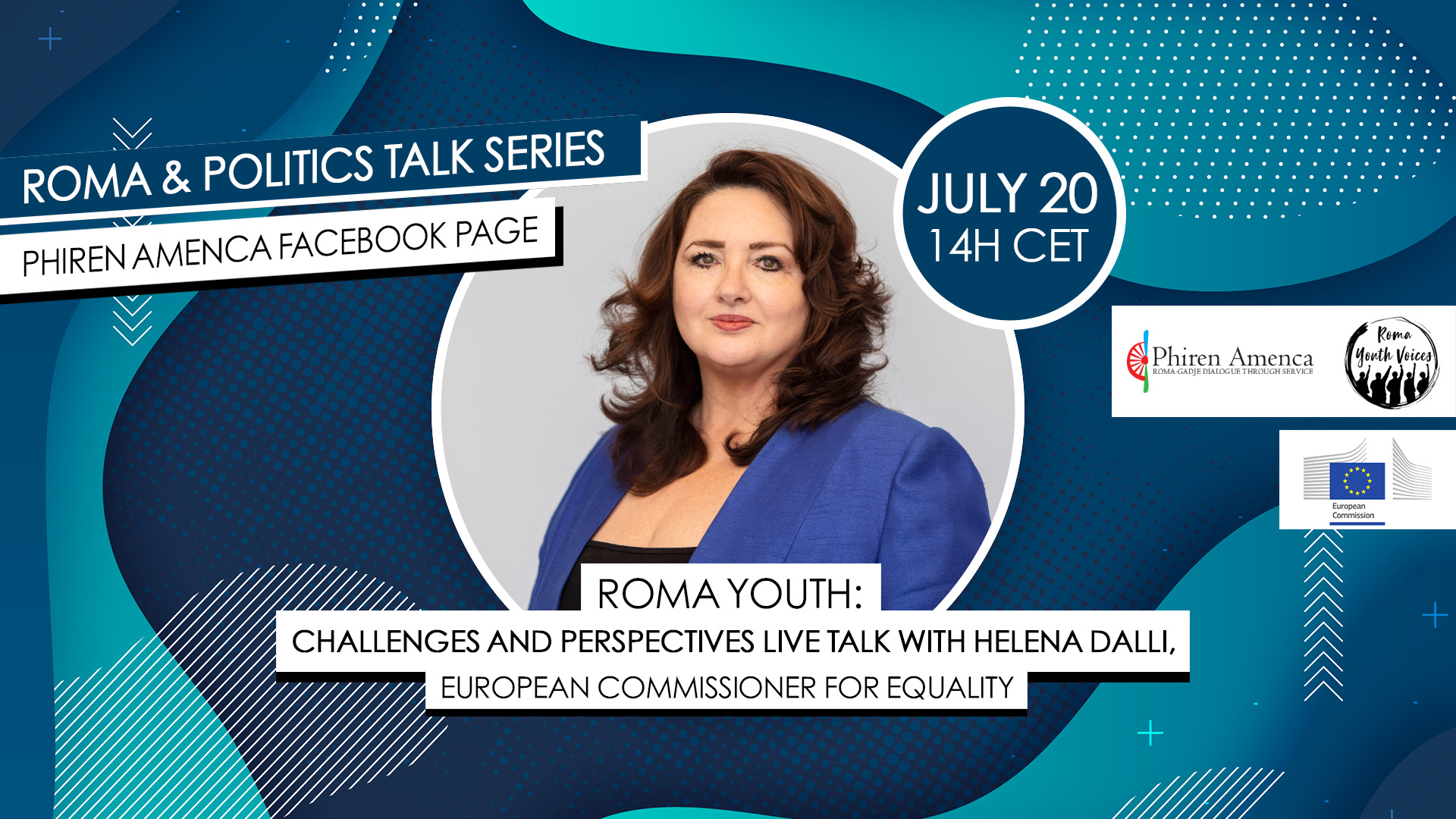“My advice to you is to keep active and lead the way. Your activism is very important for us, and we want you to be on board, we want you to be around the table when we are drafting our policies in this area” said Helena Dalli, European Commissioner on Equality at the online conversation ‘Roma Youth Empowerment and Participation: Key Towards Effective Roma Inclusion” organised by the Phiren Amenca Network and streamed online on 20 July.
The discussion was around the importance of inclusion of Roma Youth in the new 2030 EU Roma Framework and in other mainstream policies and programmes. Antigypsyism continues to be a main barrier for the effective Roma youth participation across EU Member States and to this point it is not very clear what Roma Youth can expect in the several years to come. The first question to Commissioner Dalli was “How the European Commission can better address Member States to deal with this challenge?”
“I strongly believe that young Roma are an important part of European society. Yet, despite EU legal instruments in place, since many years, Roma people continue to face deep-rooted negative public perceptions and also prejudice, and this contributes to severe disadvantages for Roma communities in all spheres of life. After almost 10 years the EU Framework for National Roma Integration Strategies ends this year. Considering the situation of Roma today, it is time for a new, more ambitious EU Policy Framework. We need to draw on the lessons of yesterday to plan for a better tomorrow. At the Commission we have been asking what have worked and what did not work. By building on past efforts we can achieve an ambitious coordinated approach on Roma equality and inclusion. That is the goal of the post-2020 agenda which my team is currently preparing. The new initiative will tackle the deep inequalities for Roma people from both a fundamental rights and economic angle and Roma youth will be a priority.
All young people around Europe face difficult challenges but for Roma youth the challenges are much harder. They have a legitimate right to be included in Roma inclusion process and mainstream policies that have a direct impact on them. Even before 2020 the Commission had made commitments to European Young Roma through a variety of tools and measures. For example, we set up the European Platform for Roma Inclusion to allow young Roma leaders and policy makers to discuss and exchange ideas. We organised Roma Youth cultural events. We placed Roma Youth high on the European agenda during the Slovak Presidency at a joint organised high-level event on Roma youth and during the Romanian presidency last year we helped to advance Roma inclusion. We encouraged Member States to involve youth in the national decision-making processes through National Roma Platforms and we provided direct funding opportunities through the Rights, Equality and Citizenship Programme. Finally, we supported events targeting youth to raise awareness about the Roma Holocaust and promote the transfer of knowledge from one generation to another.
The post-2020 agenda will continue to apply these measures and tools but it will look deeper into creating opportunities and using the potential of Roma youth by getting them to take part more in programs and through measures targeting youth. To support Roma equality and non-discrimination effectively, new measures will support active citizenship by promoting social, economic, political and cultural participation particularly for Roma women and youth; promote capacity building and leadership of Roma civil society to enable them to participate in all stages of the policy cycle and public life in general; promote employment of young Roma professionals in public institutions to support role modelling and diversity and to bring the necessary expertise and accurate knowledge of needs in the policy process; also to coordinate resources, networks and expertise across sectors to include young Roma people more in the decision making processes and help amplify the leadership. In addition, the Commission will organize a series of awareness raising events. These events will focus on Member States with large Roma communities. The goal will be to fight stereotypes, promote cultural diversity, empower and highlight Roma children, young people and women as role models in diverse communities. We will cooperate closely with the representations in Member States and the ‘Europe Direct’ information offices to arrange communication initiatives around these events. We have also learned many lessons during the coronavirus pandemic and the new initiative will reflect some of these lessons. They have for example highlighted the importance of digital skills for Roma youth.
Digital skills would allow Roma youth to better prepare for the labor market and enable them to exploit the opportunities that current and new digital tools and trends offer in daily life. I have given you just a glance at what the new post 2020 initiative will propose this autumn. I am counting on your support to promote this initiative on Roma equality and inclusion, to empower Roma, and bring more young Roma people into the decision-making process. Together we can stop Roma exclusion and give Roma Youth the tools with which to succeed at what they want to do in life”
Juraj Vozar from the Association of Young Roma, Slovakia congratulated the Commissioner on her statement: “I’m glad I am hearing these words as ambitions and tools to succeed. I hope Commission’s involvement will increase progressively in more pragmatic ways than it used to be in previous programming periods”. At his question on many Roma people losing their jobs because of the COVID-19 crisis, and the need of a timely support, the Commissioner advised that employers are using the available for SMEs programs and packages.
Marina Csikos, a young Hungarian Roma woman and a fresh graduate in ‘Critical Gender Studies’ from the Central European University brought the attention of Commissioner Dalli to the issues of Roma girls and Roma women: “We know that there are multiple disadvantages Roma girls and women do get because of the racist, sexist and colonial structures that European societies are built on. What do you think, what European instruments can the civil society use to empower Roma girls and Roma women?”
Another question from the audience was “How can we make sure that young Roma are considered as equal partners in decision making, for example, DG Justice is now preparing the new 2030 EU Roma Strategic document, to what extent the issues of young Roma will be addressed by this document?”
Commissioner Dalli’s replies: “It is very important that we work together and that the Commission has the support of Roma youth in all our future work. It’s after all about your futures which we are investing in and which we are working on so I think that it is of the essence that you are an integral part of our work. I don’t think that anyone thinks that he or she is an expert on Roma youth, more than Roma youth themselves. That is why I put a lot of importance in your contribution into whatever it is that we are doing, and that you are an important part of our public consultation, as well in the formulation of our policies, and maybe future legislation as well.
With regard to the points made by Marina, yes, you are right. I look at what you said from the intersectional perspective. You can be a woman. You can be a Roma woman. You can be a Roma woman with a disability. You can be a Roma woman with a disability and LGBTI. Roma women are not a homogeneous group, but there are various circumstances and what I promise, is that there will be nothing about women without women. We want to see that there must be women and Roma women on panels where we are discussing future policies and future legislation in this area, and Roma youth women, especially also. That is the way that we work: by inclusion. At this level of policymaking it is of the essence that you contribute because you know your reality best. You are the experts about your lives. So, I think that what we can produce together will be stronger, will be healthier because you have been included in the drafting of the policy, for instance. What I want to see is more visibility at this level of the decision-making process.
The other question was about youth participation. That, again I say that youth needs to be at the forefront and this is why I am here today: to convey this message to you or to tell you that your voice matters. And as you know, we are embarking on a new strategic framework journey and it is important that youth lead and that you help us in breaking stereotypes and taking positions of leadership, and power. We need you to enter politics, and we need you to have more of you at the local, regional, national, and European decision-making tables. We want you to have a seat at the table whenever we are discussing these issues. We can celebrate today that there are three Roma MEPs, but you know that this is in no way representative of the 10 million plus Roma in the EU. So, my advice to you is to keep active and to lead the way. Your activism is very important for us, and we want you to be on board, we want you to be around the table when we are drafting our policies in this area.
Marietta Herfort, director of Phiren Amenca stated: “We do believe and we also do work for the purpose of seeing more and more young Roma in decision making and in all levels of our society. Not only in decision making in political level but also in communities, Roma youth groups are rarely to have the same access, and this is something where we see a very big gap. It is not that easy to make sure that young Roma are benefiting from the same rights. From the beginning and very often Roma youth don’t really have access to decision making, starting with the issue that very often there is no understanding of how decision-making processes are going, if we are talking about marginalized groups. Because of this, we are also conducting currently a survey where we had interviews with 300 young Roma from EU member states, supported by the DG Justice. We feel this can be further supported to design better actions and activities targeting young Roma. The survey showed us that young Roma are really active on their own level, but they lack very often the support, even from their own communities to become more engaged and more visible on political level. Therefore, in the last few years we delivered a lot investing in how we can make Roma youth issues more visible. This is why we are insisting, in the last two years, that Roma youth become more visible in the new EU Framework and also in the National Roma strategies. Roma youth are much more successful on international level because somehow European institutions are open for these discussions, but we really lack the support on national level. So, it can also be kind of a request to the Commission to support our local organizations and us also to push a bit further that young Roma are more visible in the Member States because whenever we try these kind of discussions that we are having with you now, we find barriers very often”.
The discussion you can watch here: https://www.facebook.com/watch/v=2651915251722347



